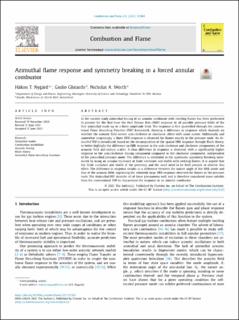Azimuthal flame response and symmetry breaking in a forced annular combustor
Peer reviewed, Journal article
Published version

Åpne
Permanent lenke
https://hdl.handle.net/11250/2765330Utgivelsesdato
2021Metadata
Vis full innførselSamlinger
Originalversjon
Combustion and Flame. 2021, 233 111565-?. https://doi.org/10.1016/j.combustflame.2021.111565Sammendrag
In the current study azimuthal forcing of an annular combustor with swirling flames has been performed to present for the first time the Heat Release Rate (HRR) response to all possible pressure fields of the first azimuthal mode up to a finite amplitude limit. The response is first quantified through the conventional Flame Describing Function (FDF) framework, showing a difference in response which depends on whether the acoustic field rotates anti-clockwise or clockwise, albeit with some scatter. Additionally and somewhat surprisingly, a finite HRR response is observed for flames exactly in the pressure node. An Azimuthal FDF is introduced, based on the decomposition of the spatial HRR response through Bloch theory, to better highlight the difference in HRR response to the anti-clockwise and clockwise components of the acoustic field and reduce scatter. A clear difference in response is observed, with a significantly higher response to the anti-clockwise forcing component compared to the clockwise component, independent of the prescribed pressure mode. The difference is attributed to the systematic symmetry breaking introduced by using an annular enclosure of finite curvature and width with swirling flames. It is argued that the finite curvature and width of the geometry and the swirl need to be both present to observe this effect. The difference in response results in a difference between the nature angle of the HRR mode and that of the acoustic field, explaining the relatively large HRR response observed for flames in the pressure node. The Azimuthal FDF describe all of these phenomena well, and is therefore considered more suitable than the conventional FDF to characterise the response in an annular combustor.
